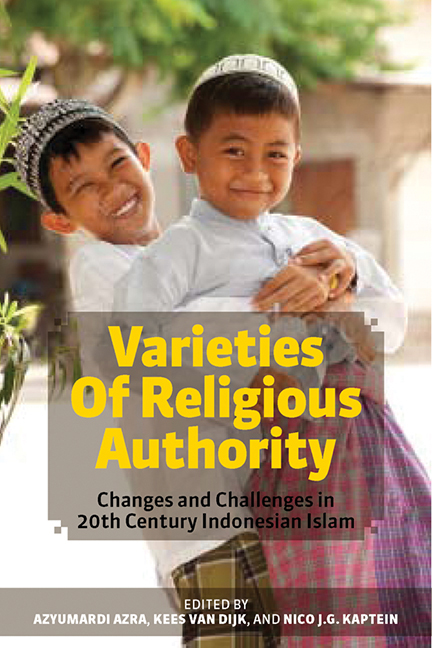Book contents
- Frontmatter
- Contents
- About the Contributors
- Acknowledgements
- Introduction
- 1 The Redefinition of Religious Authority among South Asian Muslims from 1919 to 1956
- 2 Understanding Al-Imam's Critique of Tariqa Sufism
- 3 Traditional Islam and Modernity: Some Notes on the Changing Role of the Ulama in Early Twentieth Indonesia
- 4 The Role and Identity of Religious Authorities in the Nation State: Egypt, Indonesia, and South Africa Compared
- 5 Authority Contested: Mathla'ul Anwar in the Last Years of the New Order
- 6 Struggle for Authority: Between Formal Religious Institution and Informal-local Leaders
- 7 The Indonesian Madrasah: Islamic Reform and Modernization of Indonesian Islam in the Twentieth Century
- 8 From Apolitical Quietism to Jihadist Activism: “Salafis”, Political Mobilization, and Drama of Jihad in Indonesia
- 9 From handling Water in a Glass to Coping with an Ocean: Shifts in Religious Authority in Indonesia
- 10 Religious Authority and the Supernatural
- Index
4 - The Role and Identity of Religious Authorities in the Nation State: Egypt, Indonesia, and South Africa Compared
Published online by Cambridge University Press: 21 October 2015
- Frontmatter
- Contents
- About the Contributors
- Acknowledgements
- Introduction
- 1 The Redefinition of Religious Authority among South Asian Muslims from 1919 to 1956
- 2 Understanding Al-Imam's Critique of Tariqa Sufism
- 3 Traditional Islam and Modernity: Some Notes on the Changing Role of the Ulama in Early Twentieth Indonesia
- 4 The Role and Identity of Religious Authorities in the Nation State: Egypt, Indonesia, and South Africa Compared
- 5 Authority Contested: Mathla'ul Anwar in the Last Years of the New Order
- 6 Struggle for Authority: Between Formal Religious Institution and Informal-local Leaders
- 7 The Indonesian Madrasah: Islamic Reform and Modernization of Indonesian Islam in the Twentieth Century
- 8 From Apolitical Quietism to Jihadist Activism: “Salafis”, Political Mobilization, and Drama of Jihad in Indonesia
- 9 From handling Water in a Glass to Coping with an Ocean: Shifts in Religious Authority in Indonesia
- 10 Religious Authority and the Supernatural
- Index
Summary
The transformation of Muslim societies has created new opportunities for Islam's religious scholars. Ulama have proved more resilient than earlier predictions that they would sooner or later be replaced by new elites. They have shown that the technocrats and bureaucrats of modernization and progress could not so easily marginalize them. They have also proved wrong many observers who thought that modern forms of communication and dissemination would threaten their monopoly of religious texts and authority in society. This essay contains a plea to look more carefully at the organization, role and instruments of the ulama in modern states and societies. It presents a review of ulama authority in modern South Africa, Egypt and Indonesia with a particular emphasis on their institutional formation, the limits and power of their fatwas, and their relation within and/or dependence on states. Within this framework, it is argued that the ulama play a crucial role in creating, delineating and negotiating a “religious” space in modern Muslim societies.
THE ULAMA IN CONTEMPORARY SCHOLARSHIP
With the re-emergence of religions in public life in the last few decades of the twentieth century, assessments of religious scholars have correspondingly changed. Earlier studies were focussed on the progressively subservient role that the ulama were forced to occupy in the different stages of modernization from the nineteenth century. The modernist experiments seemed set to undermine the influence of the religious classes. The nationalist and socialist trends in the period leading up to de-colonization seemed to confirm their marginalization.
Gilsenan's analysis of the ulama in the Ottoman Empire and Morocco in the nineteenth century has captured two contrasting models of ulama subordination. In the first scenario, ulama were targeted as obstacles in the modernization of Muslim societies, and they themselves took on self-appointed roles as champions of tradition. The pressure to modernize the army and its state bureaucracy was felt acutely from the eighteenth century. As the Ottoman Empire lost wars against its rivals, mainly Austria and Russia, and was trapped in the diplomatic games of more powerful players, it sought to reform its military and state machineries.
- Type
- Chapter
- Information
- Varieties of Religious AuthorityChanges and Challenges in 20th Century Indonesian Islam, pp. 73 - 92Publisher: ISEAS–Yusof Ishak InstitutePrint publication year: 2010

